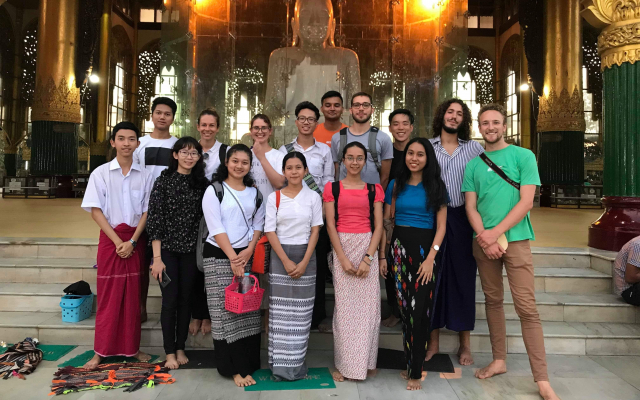
Eight UNSW Engineering students visit Myanmar in January 2019 to build a lab-scale industrial wastewater treatment process at Yangon Technological University courtesy of the New Colombo Plan.
After the previous military regime closed the campus to teaching in 1998, Yangon Technological University (YTU) in Myanmar was only allowed to resume enrolling Bachelor of Engineering students in 2012. But with few facilities, empty classrooms and scarce teaching materials, YTU academics faced an uphill battle.
Inspired by the impact they could have in helping YTU get back on its feet, several UNSW Engineering academics (including Phil Allen, Associate Professor Julien Epps, Dr Jayashri Ravishankar, Dr Iain Skinner and Professor Eliathamby Ambikairajah) reached out to their counterparts at YTU to ask what kind of help they might need to rebuild their facilities and re-establish their degree programs.
The YTU/UNSW partnership has deepened and flourished ever since, with UNSW providing multifaceted support that includes donating equipment, delivering seminars, training senior academics and engineers, sharing teaching materials, and hosting YTU academics and PhD students at UNSW. YTU, in turn, has offered opportunities for UNSW students to immerse themselves in a different culture while getting real-world project experience.
The latest expedition took place in January 2019, when eight UNSW engineering students travelled to Myanmar to work with 11 YTU engineering students on a project to install a laboratory-scale industrial wastewater treatment process control system on campus.
In the fifth year of his UNSW Mechanical Engineering and Commerce degree, James Horsley says that when he saw the email invite come through, he jumped at the chance to take part.
“In addition to the lab work, we also visited local mechanical engineering and electrical power labs, and toured the Kansai Paint factory, to further understand wastewater treatment.
Yamin Aye, third year student, UNSW Electrical Engineering degree
“Travelling to Myanmar was a fantastic opportunity. Our mission was to design and construct a method to biologically treat wastewater from industry. We designed a container with a motor to turn a shaft and an impeller that would mix the activated sludge into the paint wastewater, which is a way to make it less toxic,” he says.
“Because the project had an electrical power and wastewater focus, it gave me the opportunity to learn about something that was outside my usual skills and knowledge. It was challenging, but very rewarding.”
Yamin Aye, who is in the third year of her UNSW Electrical Engineering degree, was also thrilled to be selected to take part in the project.
“I am so thankful I was given the chance to participate and had a great experience both professionally and personally. In addition to the lab work, we also visited local mechanical engineering and electrical power labs, and toured the Kansai Paint factory to further understand wastewater treatment,” she says.
“Not only did I learn practical research skills, which will be useful in my future engineering career, but Yangon is my home town, so it was a great way to have a meaningful and productive summer holiday near my family and friends,” she continues.
Behind the scenes, pulling the whole project together was Ravishankar, a Senior Lecturer in UNSW Electrical Engineering and Telecommunications. “With a relationship with YTU going back to 2013, I was well placed to help identify the priority areas and develop the project in close collaboration with the YTU Departments of Power and Chemical Engineering,” she explains.
With a relationship with YTU going back to 2013, I was well placed to help identify the priority areas and develop the project in close collaboration with the YTU Departments of Power and Chemical Engineering.
Jayashri Ravishankar, Senior Lecturer, UNSW Electrical Engineering and Telecommunications
Ravishankar says the project has great benefits for all the students. “The knowledge exchange element is valuable for both YTU and UNSW students who, in addition, gain a much better understanding of the problems universities and industry in developing countries face,” she says.
Although she didn’t go on the January trip, Ravishankar visited YTU for the fourth time in February with the UNSW Institute of Global Development and says the feedback she received from the staff was fantastic.
“They said it was one of the greatest experiences their students could have had, and that they really value their relationship with UNSW because we are the only university supporting their students and teachers in such a practical and sustained way,” she says.
“We are now discussing the possibility of YTU undergraduate students visiting UNSW in the future and seeing how we might be able to fund that kind of trip.”
More information:
The UNSW students were supported on this trip by the New Colombo Plan Mobility Program. This program provides funding to Australian universities to support undergraduate students to participate in short-term study, internships, mentorships, practicums and research in 40 host locations across the Indo-Pacific region.
UNSW students on the expedition:
- Yamin Aye – Electrical Engineering (third year)
- Victoria Braithwaite – Electrical Engineering (second year)
- James Horsley – Mechanical Engineering (fifth year)
- Oliver Long – Electrical Engineering (fifth year)
- Dion Russell – Chemical Engineering (fifth year)
- Edoardo Santagata – Renewable Energy Engineering (fourth year)
- Shayaan Sukhla – Mechanical (Aerospace) Engineering (fifth year)
- Michael Xu – Mechanical Engineering (fifth year)
//
